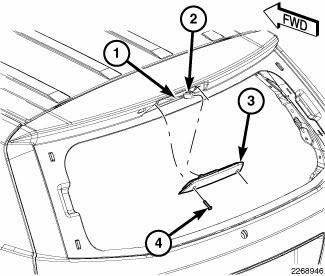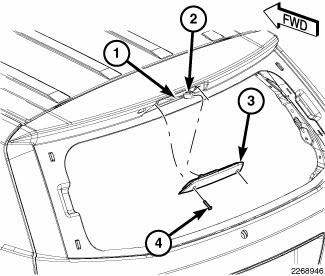Dodge Journey: Lamp, center high mounted stop
REMOVAL

Fig. 5: Center High Mounted Stop Lamp
1. Disconnect and isolate the battery negative cable.
2. Remove the two screws (4) that secure the Center High Mounted Stop Lamp (CHMSL) (3) to the liftgate header panel (1).
3. Pull the CHMSL away from the liftgate far enough to access and disconnect the connector (2) of the liftgate wire harness (1) from the connector receptacle on the back of the lamp.
4. Remove the CHMSL from the liftgate.
INSTALLATION

Fig. 6: Center High Mounted Stop Lamp
1. Check to be certain that the two U-nuts in the Center High Mounted Stop Lamp (CHMSL) opening of the liftgate header panel are properly installed and in good condition.
2. Position the CHMSL (3) near the opening in the liftgate header panel.
3. Reconnect the connector (2) of the liftgate wire harness (1) to the connector receptacle on the back of the lamp.
4. Position the CHMSL into the liftgate header opening.
5. Install and tighten the two screws (4) that secure the CHMSL to the liftgate header panel. Tighten the screws to 1.5 N.m (15 in. lbs.).
6. Reconnect the battery negative cable.
 Cam, turn signal cancel
Cam, turn signal cancel
DESCRIPTION
The turn signal cancel cam is concealed within the clockspring case on the
steering column. The turn signal
cancel cam consists of integral eccentrics on the outer circumference of the ...
 Lamp, fog, front
Lamp, fog, front
REMOVAL
BULB
CAUTION: Do not contaminate the bulb glass by touching it with
your fingers or by
allowing it to contact other oily surfaces. Shortened bulb life will
result.
...
See also:
Description, Operation
DESCRIPTION
The A/C refrigerant lines and hoses are used to carry the refrigerant between
the various A/C system
components. The refrigerant lines and hoses for the R-134a A/C system consist of
...
Without intermediate shaft
NOTE: The inner tripod joints are designed with a retention feature
that prevents the
tripod rollers from coming out of the inner joint housing up to a specific
load. If
this feature is o ...
Switch, heated seat
DESCRIPTION
Fig. 10: Locating Accessory Switch Bank Module
Two heated seat switches are located in the center stack of the instrument
panel. The switches are located on the
outer edges of the A ...
